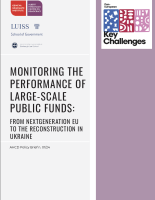The initiative “Pan-European Key Challenges” was launched in 2022 to promote the exchange of experiences across European countries around the management of large-scale public funds. Led by the Albert Hirschman Centre on Democracy, the Edinburgh Law School, and the Luiss School of Government in Rome, it builds on the study of unspent and underspent public funds that is being conducted in the SNSF Sinergia project “Reversing the Gaze”.
This effort is rooted in a comprehensive examination of unutilised and underutilised government funds, pointing to an urgent need to refine the institutional, legal, and administrative frameworks governing such financial disbursements. It aims to bolster the exchange of insights and methodologies for the effective utilisation of government money, including EU funds, and democratic accountability. Insights and recommendations on how to design and adapt the spending system bear significance and relevance to a variety of actors: beneficiaries, donors, implementing bodies, controlling bodies and the citizenry at large.
Convened on 26 February at the Geneva Graduate Institute, the most recent policy roundtable was entitled “Monitoring the performance of large-scale public funds: From NextGenerationEU to the reconstruction in Ukraine”.
The roundtable delved deeper into the challenges and innovative solutions required for managing public funds amidst crises. With a staggering €806.9 billion allocated through the Recovery and Resilience Facility (RRF) for Europe’srecovery post-COVID-19, and significant allocations directed towards Ukraine’s rebuilding, the effective management of these funds is paramount.
Attended by an interdisciplinary group of scholars and experts, the roundtable zeroed in on dissecting the complex dynamics of fund management, spotlighting the necessity for enhanced accountability, the development of effective performance indicators, and the promotion of democratic participation in the allocation and supervision of these funds.
The resultant policy brief from this roundtable proposes actionable recommendations for enhancing fiscal efficiency, ensuring democratic accountability, and improving the technical management of public funds in Europe. It highlights the criticality of detailed, standardized data and advocates for timely training programmes for civil servants to establish a solid foundation for the judicious allocation and monitoring of government money.
The roundtables and the resulting policy briefs of the “Pan-European Key Challenges” initiative underscore the crucial need to learn from and capitalise on previous experiences when designing new funding schemes in the EU and beyond.



